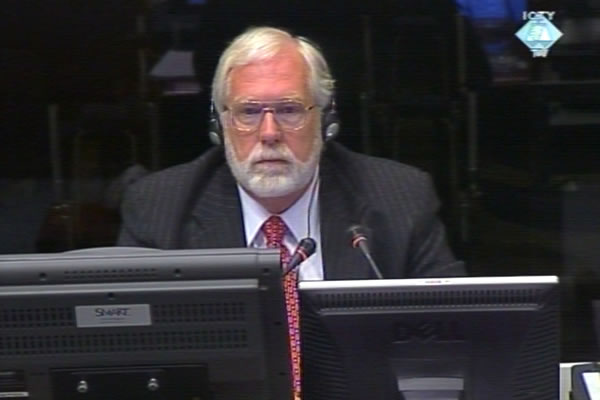Home
GOD OF WAR OR PEACE
Radovan Karadzic continues his cross-examination of prosecution expert Robert Donia. Not pleased with the moniker ‘god of war’ - as he was called in October 1991 by a Croat delegate in the BH Assembly - Karadzic tried to show that he had in fact been a ‘peace-loving man’. The words that the others interpreted as threats were in fact ‘warnings’ to Muslims to ‘deter them from war’
 Robert Donia, witness at the Radovan Karadzic trial
Robert Donia, witness at the Radovan Karadzic trial Continuing his cross-examination of prosecution expert Robert Donia, Radovan Karadzic moved on to his famous speech before the BH Assembly on 14 and 15 October 1991, when he said that a declaration of independence would take BH to ‘that same highway to hell and destruction’ that Croatia and Slovenia had taken earlier. That highway ‘may take Muslim people possibly to its disappearance’, Karadzic said. This is, in Karadzic’s view, ‘the central event in the crisis’ before the conflict broke out in BH and the key element of both the indictment and the witness’s evidence.
In Donia’s opinion, it was an ‘impassioned speech’ which acquired a ‘warmongering’ tone towards the end, and finally turned into ‘an aggressive expression of the Serb position’ on vote for a declaration of independence of BH. ‘I feel the same passion in you now when you read parts of your speech’, the witness said, noting he didn’t doubt that Karadzic had ‘sincerely believed it then, when he made the speech and today, as he is reading it’.
Karadzic then brought up a transcript of a telephone conversation with Rasim Kadic on 16 October 1991. The president of the Liberal Democratic Party told Karadzic that in his view the declaration of BH independence had not been ‘done in accordance with the law’ and that ‘Europe will not stomach it’. Kadic then told Karadzic that he didn’t vote for the declaration. Karadzic interpreted it as an expression of Kadic’s ‘empathy and support’.
Karadzic insisted on his own, as he put it, ‘state of mind’ in the period before the Assembly session, showing the witness a number of his own interviews and transcripts of intercepted conversations. The documents in Karadzic’s opinion showed that his intentions had been ‘peaceful’ compared to the intentions of SDA leader Alija Izetbegovic who ‘sought a pretext for war’. Donia interpreted Karadzic’s words as open threats of war; the accused said they were only warnings whose purpose was to deter Muslims from war.
Karadzic corroborated his claims with quotes from an intercepted telephone conversation with author Gojko Djogo, Karadzic’s longtime friend. After Karadzic read several sentences, Donia reminded him that in the same conversation, after presenting the ‘peaceful intentions’ – in the parts he quoted in the courtroom today – Karadzic went on to elaborate ‘such a scenario of destruction’ of the Muslim population that his previous statements could hardly be given any weight.
Donia noted that Momcilo Krajisnik criticized Karadzic for using terms such as ‘annihilation’ and ‘disappearance’ but Karadzic didn’t heed the words of warning. Donia also reminded Karadzic that those terms ‘crept into’ his speech at the BH Assembly session, concluding that Karadzic spoke in a ‘threatening manner’ against Bosnian Muslims.
Not pleased with the moniker ‘god of war’, ‘unjustly given by a Croat delegate’, as Karadzic put it, Karadzic asked Donia if he really believed that Karadzic could control a million and half Serbs if somebody wanted to take them back to the ‘Turkish age’. ‘Yes, I believe that you had sufficient control over the Serbian Democratic Party’, the witness replied.
The Trial Chamber ordered Karadzic to complete his cross-examination of the witness tomorrow.
Linked Reports
- Case : Karadzic
- 2010-06-07 BOSNIAN SERB LEADERSHIP HAD SEPARATIST INTENTIONS
- 2010-06-04 KARADZIC AND PROSECUTION EXPERTS’ PAYMENTS
- 2010-06-03 KARADZIC’S ‘LOVE FOR SARAJEVO’
- 2010-06-09 DID WITNESS ‘DEFAME’ KARADZIC
- 2010-06-10 KARADZIC: WITNESS IS UNPROFESSIONAL AND BIASED
- 2010-06-15 KARADZIC’S DOCTRINE OF ‘ARMED PEOPLE’
